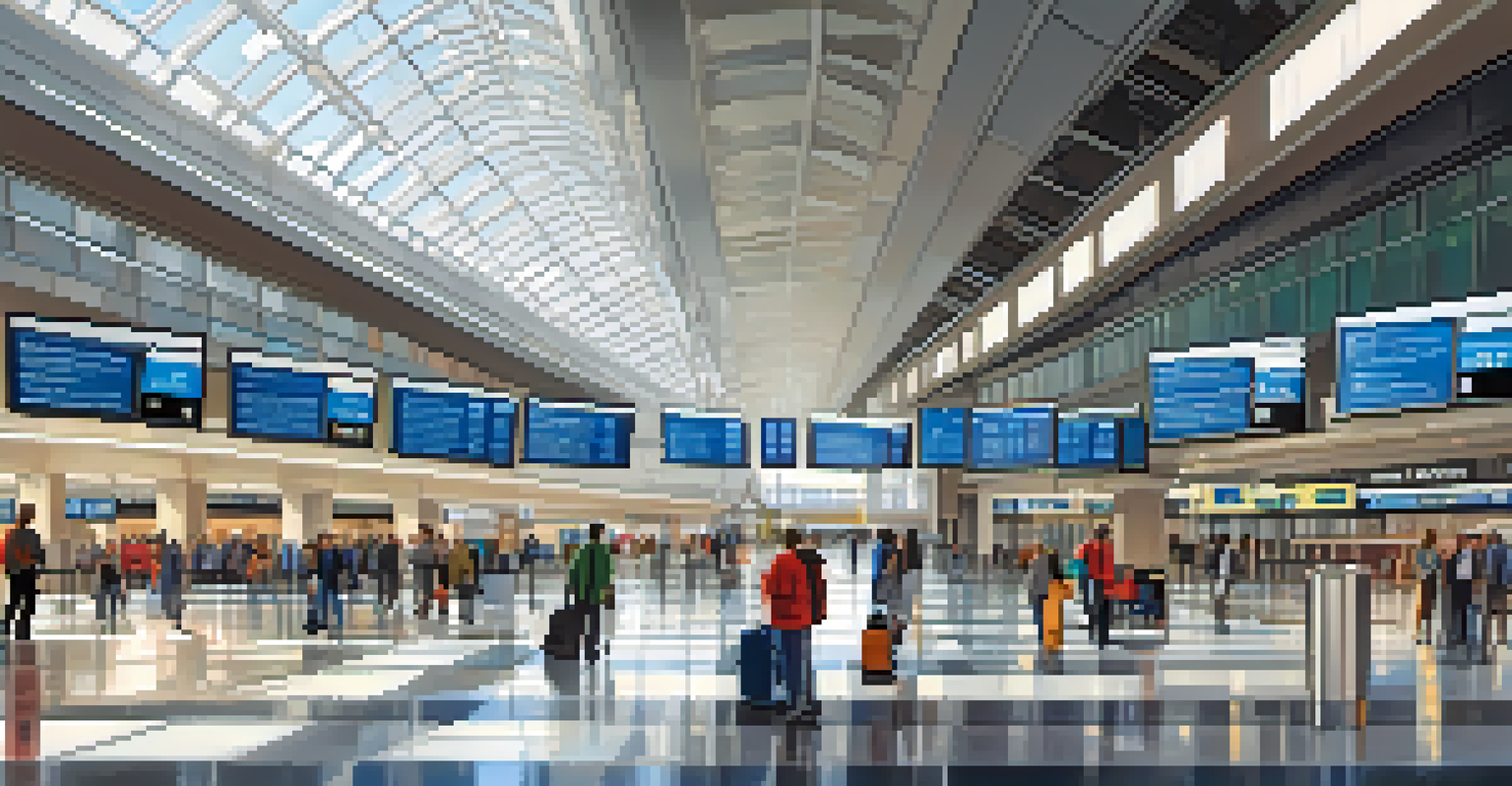The Impact of Hartsfield-Jackson on International Commerce

Introduction to Hartsfield-Jackson International Airport
Hartsfield-Jackson International Airport (ATL) stands as a key player in global aviation, often ranking as one of the busiest airports in the world. Located in Atlanta, Georgia, it serves as a major hub for both domestic and international flights, connecting millions of travelers daily. The airport's strategic location in the southeastern United States makes it an ideal gateway for international trade and commerce.
Airports are the gateways to the world, and they play a pivotal role in global trade and commerce.
With over 200 gates and numerous airlines operating from its terminals, Hartsfield-Jackson plays a pivotal role in facilitating air cargo and passenger transport. Its expansive infrastructure supports a wide range of industries, from agriculture to technology, reinforcing Atlanta's position as a commercial powerhouse. This connectivity not only enhances economic development but also fosters cultural exchange.
As global trade expands, ATL's ability to adapt and innovate ensures that it remains relevant in an ever-changing economic landscape. The airport's impact reaches far beyond its runways, influencing regional economies and global partnerships alike. Understanding this influence is crucial for grasping the dynamics of international commerce.
Economic Boost to Atlanta and Surrounding Regions
The economic impact of Hartsfield-Jackson on Atlanta and the surrounding regions is substantial. With thousands of jobs created directly at the airport and indirectly through supporting industries, it contributes significantly to local employment. The presence of the airport attracts businesses looking for strategic locations, thereby increasing investment in the area.

Local restaurants, hotels, and retail shops thrive due to the influx of travelers and cargo. This vibrant ecosystem not only supports existing businesses but also encourages new ventures. For instance, companies that rely on expedited shipping often set up operations near ATL to capitalize on its logistics advantages.
Economic Impact of ATL Airport
Hartsfield-Jackson International Airport significantly boosts Atlanta's economy by creating jobs and attracting businesses.
Moreover, the airport serves as a vital link for international companies looking to establish a foothold in the U.S. market. By providing easy access to global supply chains, Hartsfield-Jackson enhances Atlanta's reputation as a business-friendly city, making it a preferred destination for international commerce.
Role in Global Supply Chain Management
Hartsfield-Jackson is a critical node in the global supply chain, enabling swift movement of goods across borders. This efficiency is particularly vital for industries that depend on just-in-time delivery, such as automotive and electronics. The airport's cargo operations support a diverse range of products, from fresh produce to high-tech components.
Sustainability is not just a trend; it’s an essential strategy for the future of our planet and economy.
With state-of-the-art facilities and advanced logistics capabilities, ATL ensures that shipments are processed quickly and efficiently. This not only reduces transportation costs but also minimizes delays that can disrupt supply chains. Consequently, businesses benefit from increased reliability and flexibility in their operations.
Additionally, Hartsfield-Jackson's connectivity to major international markets allows companies to expand their reach. By facilitating trade with countries around the world, the airport helps local businesses tap into new opportunities and grow their customer base.
Facilitating Cultural Exchange and Tourism
Beyond commerce, Hartsfield-Jackson plays a vital role in promoting cultural exchange and tourism. As one of the primary gateways to the U.S., the airport welcomes millions of international visitors each year. This influx of travelers not only boosts the local economy but also enriches the cultural fabric of Atlanta.
Tourism-related businesses, such as hotels, restaurants, and attractions, thrive due to the airport's connectivity. Events like the Atlanta Film Festival and the Atlanta Dogwood Festival attract global audiences, further highlighting the city's cultural significance. As visitors explore the city, they contribute to the local economy, creating a cycle of growth.
Global Supply Chain Connectivity
The airport serves as a critical hub in the global supply chain, facilitating efficient movement of goods and enhancing trade.
Moreover, Hartsfield-Jackson's commitment to customer service and efficiency enhances the overall travel experience. This reputation for excellence encourages more travelers to choose Atlanta as their destination, thereby solidifying the airport's position as a cultural and economic hub.
Environmental Considerations and Sustainability Efforts
As international commerce grows, so do concerns about the environmental impact of air travel and logistics. Hartsfield-Jackson is actively working to address these challenges through various sustainability initiatives. From energy-efficient terminals to noise reduction programs, the airport is committed to minimizing its ecological footprint.
The implementation of alternative fuel sources and electric ground support equipment reflects the airport's dedication to sustainable practices. Additionally, partnerships with local organizations focus on enhancing biodiversity and preserving green spaces around the airport. These efforts not only benefit the environment but also improve the quality of life for nearby communities.
By prioritizing sustainability, Hartsfield-Jackson sets an example for other airports globally. The airport demonstrates that economic growth and environmental responsibility can coexist, paving the way for a more sustainable future in international commerce.
Technological Innovations Enhancing Operations
Technological advancements play a crucial role in enhancing the efficiency and effectiveness of Hartsfield-Jackson's operations. From automated baggage handling systems to advanced security technologies, these innovations streamline processes and improve the overall travel experience. This focus on technology ensures that the airport can handle increasing passenger and cargo volumes.
Moreover, the integration of data analytics and artificial intelligence helps optimize flight schedules and cargo management. This not only reduces wait times for passengers but also enhances the reliability of cargo deliveries. By leveraging technology, Hartsfield-Jackson remains at the forefront of the aviation industry, adapting to the ever-changing demands of international commerce.
Commitment to Sustainability
Hartsfield-Jackson actively implements sustainability initiatives to minimize its environmental impact while promoting economic growth.
As the airport continues to innovate, it becomes a model for other transportation hubs aiming to improve their operations. The commitment to embracing technology not only benefits the airport but also reinforces its role as a vital player in global trade.
Future Outlook: Challenges and Opportunities Ahead
Looking ahead, Hartsfield-Jackson faces both challenges and opportunities in its quest to maintain its status as a leading airport for international commerce. The ongoing impacts of the COVID-19 pandemic have reshaped travel patterns and consumer behavior, necessitating adaptive strategies. As global travel rebounds, the airport must prepare for fluctuating demand and evolving traveler expectations.
Additionally, competition from other airports vying for international flights presents a challenge. To stay ahead, Hartsfield-Jackson must continue to innovate, enhance its services, and invest in infrastructure improvements. This proactive approach can help the airport attract new airlines and routes, solidifying its position as a vital international hub.

Despite these challenges, the future remains bright for Hartsfield-Jackson. By leveraging its strengths, embracing technological advancements, and focusing on sustainability, the airport is well-positioned to navigate the complex landscape of international commerce in the years to come.